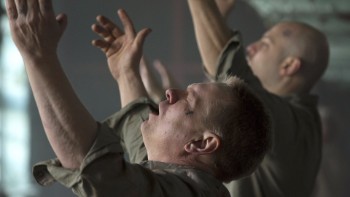
Nik and Ruth Ripken, missionaries from Kentucky, visit the gravesite of their son who died during their time on the mission field. Photo by IMB
When Nik and Ruth Ripken moved with their three sons to Africa, they had no idea how much obedience to Christ would cost.
The assassination of four Somali Christian friends and the death of their son Timothy rocked the foundations of their faith. Their spiritual crisis launched a search for answers. They needed to know: is Jesus worth it? Is love more powerful than hate? Can faith in Jesus survive—let alone thrive—in hostile places?
For fifteen years Nik and Ruth crisscrossed the globe to interview more than 700 persecuted Christians in over seventy-two countries.
Can faith in Jesus survive—let alone thrive—in hostile places?
The Insanity of God is their story. The film documents their odyssey through suffering toward resurrected faith. Dramatized reenactments bring to life some of the testimonies they heard from persecuted Christians in Russia, East Asia, and the Middle East.
When the film premiered in August, many of the more than 400 theaters showing the movie sold out. In September, ticket sales for the film topped $1.1 million.
In anticipation of the upcoming DVD release of the film, I talked with producer Craig Martin about adapting the riveting story for the screen.
A behind-the-scenes look at The Insanity of God
Eliza: Can you tell me about discovering the Ripkens’s story?
Craig: Years ago I heard Nik speak and I remember thinking, “This guy’s experience is amazing.” He’s so powerful as a speaker. While Nik was writing the book, we were talking about how to get churches interested in the story. I told him that if he wanted to connect with younger people, then the book really needed to be made into a movie.

A actor depicting a prisoner worships during the film “Insanity of God.” Photo by IMB
Eliza: Is that the only reason you felt the book needed to be made into a movie?
Craig: A book is a very personal event, but a film can be a social event. That’s important because when you’re viewing something with a group of people, everybody is going to take away something different. Then they’ll talk about what they saw. Film is a discussion starter. It makes the stories more accessible to more people.
Eliza: How were Nik and Ruth involved in the production of the film? Did they have strong ideas about the way they wanted their story told?
Craig: They let us run with it, but a couple of scenes required them to be present. When we filmed in Africa, they went with us. We wanted them to go to the gravesite where their son, Timothy, is buried. In those locations they gave a lot of input about the story.
They were only on set for one reenactment. When we shot the story of Dmitri, the Russian pastor imprisoned and tortured for his faith, they were with us. We filmed that scene at the West Virginia State Penitentiary with actors from Pittsburg, many from Russian descent. The prison is historic; it was built before the Civil War.
Eliza: You filmed in an actual penitentiary? That location looks rough. I thought it had to be a set.
Craig: Yeah, I can’t believe prisoners actually lived in those conditions. The metal frame beds were cemented into the concrete right beside the shared toilet. The cells were so small that when you stand up, you can reach out and touch both walls. Ultimately, the West Virginia Supreme Court ruled that those cells constituted cruel and unusual punishment.
When we were filming there, Nik actually got up and preached a short sermon. He didn’t miss an opportunity to share his faith with the crew and actors.
Eliza: How did you decide which scenes from the book needed to be dramatized
Craig: When I was reading the book, I visualized the scenes I thought were the most important to see. Some we just couldn’t include. One story we filmed, but had to cut was the scene where Nik’s Somali coworker, Omar Aziz, walks all the way from Mogadishu to attend Timothy’s funeral. When he arrives at the door, he says, “I’ve come to bury our son.” I loved that scene, but it didn’t work in the film.
Eliza: Was Timothy’s death the most emotional moment in the film for you?
Craig: Definitely. Tim’s death scene is always hard to watch because I’ve become so attached to Nik and Ruth. Once I even introduced Ruth as my second mom. Watching their son’s death is always emotional for me.
Eliza: For me one of the most emotional moments was at the very end when the simple line, “In Memory of Timothy Ripken,” emerges from a black screen after we hear Dmitri singing his own heart song.
Craig: Dmitri’s song is authentic. We wanted to use it, but Nik couldn’t find it among all the hundreds of interview tapes. I started wondering if it would turn up, but eventually he found it. When you hear it at the end, it’s the actual recording.
Heart songs inspire an original soundtrack
Eliza: Let’s talk about the music in the film. Nik describes how heart songs fuel faith in the lives of those enduring persecution. Is that one of the reasons the score was an important aspect of this project for you?
Craig: I think music lives on beyond books and film. When I first heard Nik’s story, I thought that it needed to be a book, a film, and a music project. I grew up in Asia as a missionary kid, and music did a lot to inspire me everyday. I wanted the music for the film to be original and inspired by stories of faith in persecution.
Todd Smith of (the music group) Selah produced the music with Ed Cash and released the album as a CD and on iTunes: Music Inspired by the Insanity of God.
When I initially talked to Todd about the project, I told him Dmitri’s story. That’s how he got hooked. Todd wrote the Russian song sung by the prisoners in the penitentiary, but it’s based on Dmitri’s heart song. Todd did all the research. He found the original song, and he worked from it to write the piece of music performed for the film by a Russian choir.
A film as a wake-up call
Eliza: Nik’s story spans decades and continents. From the standpoint of creative direction, it must have been difficult to integrate the documentary elements of the film with the reenactments. Seeing Nik’s audio tapes of his interviews helped unify the film. For me, they also were a visual cue that these stories are authentic and have been documented.
Craig: Greg Smith and Andy Duensing came up with the brilliant idea of filming the tapes. Those tapes became a way of marking the chapters of the story. They became representative of each region and each person’s story. In the end when we see all the tapes, it’s a powerful testimony.
In terms of authenticity, I’ve heard Nik tell some of these stories at least fifteen times. They’ve become a part of the fabric of who he is now. They made such an impression that they’re just seared into him.
Eliza: What has the reaction to the film been so far?
Craig: Often at a screening, it’s emotional. Sometimes you hear people weeping. When we showed it at the National Religious Broadcasters in Nashville, people were stunned. One person said, “I’ve got to tell you that your film is not entertaining. It’s not entertaining, but it is convicting and inspiring.”
Eliza: What impact do you hope the film will have on Christians in the United States?
Craig: I hope it is a wake-up call.
I was sitting on a plane to Nashville and I start talking with a woman sitting next to me. I told her I was working on the film. She said, “No way, I’m reading the book right now! And I’m praying about going to the mission field.”
Nik says so clearly that there’s not a persecuted church and a free church, there’s just one church. I think that has really struck some people. For me, that was the whole point of doing the project.
The Insanity of God film was produced by the International Mission Board and Cooke Pictures and distributed by LifeWay Films. Nik and Ruth Ripken, from Kentucky, have served with the IMB since 1983. (IMB)
Eliza Thomas